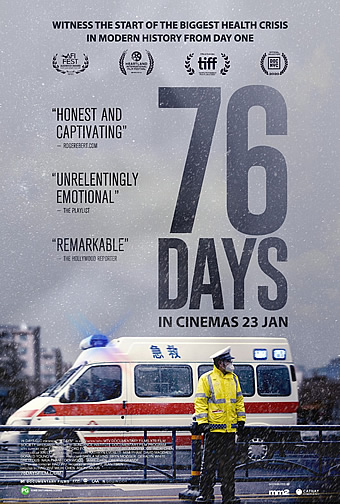76 DAYS (2020)
Genre: Documentary
Director: Wu Hao
Runtime: 1 hr 33 mins
Rating: PG (Some Disturbing Scenes)
Released By: mm2 Entertainment
Official Website:
Opening Day: 23 January 2021
Synopsis: On January 23rd, 2020, China locked down Wuhan, a city of 11 million, to combat the emerging COVID-19 outbreak. Set deep inside the frontlines of the crisis in four hospitals, 76 DAYS tells indelible human stories at the center of this pandemic—from a woman begging in vain to bid a final farewell to her father, a grandpa with dementia searching for his way home, a couple anxious to meet their newborn, to a nurse determined to return personal items to families of the deceased. These raw and intimate stories bear witness to the death and rebirth of a city under a 76-day lockdown, and to the human resilience that persists in times of profound tragedy.
Movie Review:
Some films do not need a review, and ’76 Days’ is one of them. In case it isn’t yet apparent, the title refers to the period of time the capital city of Hubei province was placed in lockdown last year in order to stem the spread of the COVID-19 virus. It was then an unprecedented move in modern history, and some Western commentators had criticised it as yet another demonstration of the Communist Party’s oppressive ways; of course, the subsequent events of 2020 have proven that those views were myopic and indeed silly.
A collaboration between US-based Chinese filmmaker Hao Wu and two China-based co-directors – one of them named Chen Weixi and the other who has elected to remain anonymous, ’76 Days’ offers a shockingly intimate look at the frontlines where the COVID-19 battle was being fought. It doesn’t just take place within the city of Wuhan; indeed, the filmmakers have managed to photograph unprecedented footage in four hospitals over the course of the city’s lockdown last winter.
Wisely, the directors choose not to record any narration over the footage; rather, they have decided to let the images of the doctors and nurses clothed in full personal protective equipment struggling to save lives while coping with the psychological and emotional distress of their patients speak for themselves. It is harrowing all right, and utterly gripping, not only because it chronicles the start of what would eventually become the most severe medical crisis of generations, but also because it shows what these medical personnel were faced with at a time when knowledge about the virus was still scarce.
Without any fanfare, we are introduced to the various real-life characters whose fates we will follow over the course of the movie: an elderly man suffering from dementia who is impatient to get back home; a pregnant lady who is not allowed to have her husband by her side while she is delivering her baby; an elderly woman who is worried about the wellbeing of her husband; and last but not least, another elderly woman whose bedside is marked by a medical glove inflated like a balloon with the words ‘get well soon’ and a smiley face inscribed on it. Some will get better, some will not; such is the nature of the disease, which has no favourites.
The day-to-day lives of the doctors and nurses are also captured in sharp focus. Some have journeyed from other provinces to help their fellow professionals in Wuhan, driven as much by selflessness as a desire to be among those counted as medical heroes. Each day however is the same gruelling routine of putting on their PPE, scrawling their names at the back with a marker, doing their rounds, managing the myriad requests of their patients, and hoping that their interventions will prove enough for those ill to fight and overcome the virus.
On occasion, the scene shifts to outside the hospital, and it is there we glimpse the system established in order to help the people of Wuhan cope with the lockdown, including civil groups stepping up to distribute food to neighbourhoods, residents queuing behind barricades to get their supply of meat and vegetables, and the eerily quiet streets whose silence is pierced every now and then by the wailing sirens of ambulances. There is no politics here, just a fly-on-the-wall observational account of what had happened in Wuhan over those 76 days.
And by virtue of its honesty and authenticity, ’76 Days’ deserves to be seen by one and all. Sure, many cities around the world have since had their own lockdown experiences deserving of such a chronicle, but this is as insightful a look at Ground Zero as it gets. Like we said, some films do not need a review; ultimately, there is no artistic license exercised or needed here, because this is as raw, as real, and as important a film as it gets during these pandemic-stricken times.
Movie Rating:





(As close to a must-see film as it gets, this honest, authentic and utterly gripping account of the period when the city of Wuhan was placed on lockdown is probably the most important film of these COVID-19 times)
Review by Gabriel Chong

